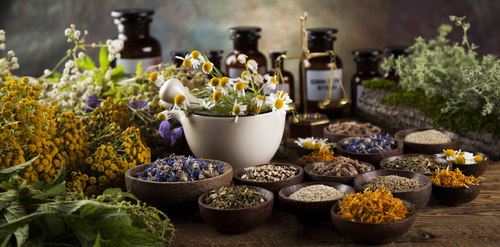Your Skin Knows How to Complain
Sometimes your skin just decides to throw a tantrum—dry patches, weird rashes, stings from who-knows-what, or a burn from grabbing that hot pan too fast. We’ve all been there. The thing is, you don’t always need to raid the pharmacy when something flares up. A handful of home staples—stuff that’s probably already in your pantry or fridge—can calm things down without a lot of fuss.
Growing up, our medicine cabinet had more mason jars than medicine bottles. Aloe on the windowsill, a tub of coconut oil on the counter, and that one jar of mysterious brown salve that someone’s grandma made (and no one dared question). Over the years, I’ve tested a ton of these natural remedies myself. Some didn’t do much, but a few became trusted, go-to fixes that have stood the test of time—and more than a few scraped knees and kitchen burns.
[Ad Banner #1 Here]
1. Aloe Vera: First Aid’s Best Friend
If there’s one plant I think everyone should keep around, it’s aloe. Snip a leaf, squeeze out the cool gel inside, and you’ve got instant relief for sunburns, minor kitchen burns, and itchy rashes. It’s got anti-inflammatory and soothing properties that help take the sting and redness down right quick.
How to use it:
-
Cut a piece of aloe leaf and slice it open.
-
Scoop out the gel with a spoon and apply it directly to the irritated area.
-
Store the extra gel in the fridge—it feels even better chilled.
No aloe plant? You can use store-bought gel, just make sure it’s pure and doesn’t have a bunch of weird perfumes or dyes added.
2. Oatmeal Soak: A Hug for Angry Skin
Oatmeal isn’t just breakfast—it’s a lifesaver for dry, itchy skin. Great for eczema flare-ups, mystery rashes, and when your whole body feels like it’s crawling.
Make an easy bath soak:
-
Grab a cup of plain, uncooked oats (nothing sugary).
-
Blend or grind them into a fine powder.
-
Sprinkle into warm bathwater and soak for 15–20 minutes.
It softens the skin, soothes irritation, and gives you a little quiet time too. I used to make this for my niece when her eczema flared up—worked like a charm and gave her a reason to love bath time again.
3. Coconut Oil: The Old Reliable
I keep a jar of coconut oil in the bathroom and the kitchen. It’s rich, gentle, and deeply moisturizing. Perfect for dry patches, chapped skin, and even mild eczema. Bonus: it’s got antibacterial properties, so it helps protect minor cuts from getting angry.
Quick use:
-
Dab a small amount onto clean skin, especially after a shower when your skin’s still damp.
-
For little cuts or cracked skin, you can add a drop of tea tree oil for extra germ-fighting power—just do a patch test first.
[Ad Banner #2 Here]
4. Baking Soda Paste: Bug Bites Be Gone
Got a mosquito bite that won’t quit? Or a rash that stings a bit more than it should? Baking soda to the rescue. It helps neutralize the skin’s pH and ease that itchy, prickly feeling.
Simple fix:
-
Mix 1 tablespoon of baking soda with just enough water to form a paste.
-
Apply directly to the irritated area and let it sit for 10–15 minutes.
-
Rinse off with warm water and pat dry.
My youngest brother used to come in every summer evening with a dozen bug bites—this paste was the only thing that kept him from scratching himself into a frenzy.
5. Calendula Salve: Nature’s Bandage
If you haven’t used calendula before, you’re in for a treat. It’s a bright little flower with big healing power—perfect for minor cuts, scrapes, and those dry, cracked spots that never seem to go away.
You can find premade calendula salve at most health stores, or make your own if you’re feeling adventurous. It helps reduce redness and speeds up healing while keeping the skin soft and protected.
How to apply:
-
Clean the affected area.
-
Dab a small amount of salve on, then cover with a breathable bandage if needed.
-
Reapply a couple times a day until it clears up.
I keep a small tin in my bag at all times—it’s saved my hands more than once after a long day in the garden or doing dishes nonstop.
A Few Friendly Tips Before You Slather
Even natural stuff can be irritating if your skin’s already mad, so go slow and always do a small patch test first—especially if you’ve got sensitive skin. And don’t use oils or thick salves on open wounds unless they’re healing over; keep it clean and simple. If a rash spreads, starts oozing, or gets worse after a couple days, best to check in with a doctor.
Let Your Skin Breathe a Little Easier
Skin problems can be downright distracting—but the fixes don’t have to be complicated. A bit of aloe here, some oatmeal there, and a spoonful of coconut oil when you’re feeling dry can make a world of difference. These remedies are quiet, gentle, and easy to work into your day.
Try one. Mix two. Tuck them away for the next time your skin throws a fit. And if you’ve got a favorite skin soother tucked away in your own memory bank, don’t keep it to yourself—I’d love to hear what works for you.



























